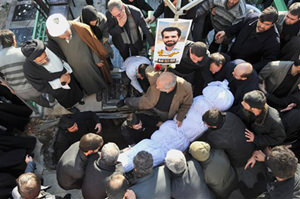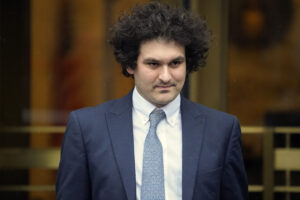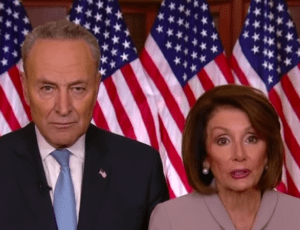Iran, the U.S. and Israel: Blind Man’s Bluff
A lot of people with important-sounding titles pontificate on what lies ahead, but whom are they kidding? It’s like we’re watching kids playing around with vials of highly volatile chemicals.In a perilous spiral of assassinations, threats and counterthreats, leaders in Washington, Jerusalem and Tehran keep ratcheting up the tension.
In a perilous spiral of assassinations, threats and counterthreats, leaders in Washington, Jerusalem and Tehran keep ratcheting up the tension. What is most alarming about the situation is that the principal players and their advisers are engaged in an incredibly dangerous three-way game of blind man’s bluff.
None of them expresses a real understanding of the others — their motives, their concerns or their likely reactions. That’s true even for Israel and the United States: Though the U.S. risks being sucked into any conflict between Israel and Iran, the Obama administration is currently forced to guess what its supposed allies in Israel are planning.
What would America or Israel — or any country — do if five of its scientists were assassinated by an enemy power? How would such a country react if, at the same time, another nation dispatched forces toward its borders while tightening an economic blockade?
Would that country kowtow to a demand that it terminate any activities related to the research or development of nuclear weapons (which, of course, both Israel and the U.S. possess) or lash out in violent reprisal?
A lot of people with important-sounding titles pontificate on what lies ahead, but whom are they kidding? It’s like we’re watching kids playing around with vials of highly volatile chemicals. No one’s sure when an explosion will come, or how calamitous might be the chain reaction it ignites.
What makes the situation even more perilous is the fact that the leaders of the three countries involved — Israel, Iran and the U.S. — are all challenged by strident enemies in their own nations. Since this dispute plays front and center, every move they make is automatically the target of virulent homegrown — and often woefully ignorant — opponents.
In other words, if the leaders and their advisers were more secure on their respective thrones, they might all be able to follow a much cooler, more rational course. They might even be able to sit down and negotiate with the other nations.
Worse is the likelihood that the principal actors, their advisers, intelligence agencies and domestic critics don’t really comprehend what the others are up to—where they are coming from and what they want to achieve.
If it’s not blind man’s bluff, it’s shadow boxing—sparring with caricatures: In this corner, the deceitful bearded mullahs in Tehran obsessed with obtaining nuclear weapons to exterminate Israel and establish a new caliphate. In that corner, the grasping imperialists in Washington, who for decades have used the CIA and the American military to put down movements of national liberation, sustain the Zionist state of Israel and the corrupt oil-rich Arab dictators.
Those caricatures become so deeply entrenched that even the supposedly objective intelligence agencies of each of the combatants—not to mention the mainstream media—tend to censor, edit out or shy away from information that runs counter to official “truth.”
I had a personal run-in with this phenomenon in 1980, when I was a producer at “60 Minutes” covering the ongoing revolution in Iran during the hostage crisis.
Traveling back and forward between Tehran, New York and Washington, I was struck by the total inability of Americans, even at the highest level, to understand the emotions and history that drove the hatred of all things American that had exploded in Iran with the fall of the Shah of Iran.
Just up West 57th Street from CBS News, for instance, was a huge billboard with the diabolical image of Ayatollah Ruhollah Khomeini glowering down on New York.
I suggested we do a report to give Americans a better idea of what was driving Iran’s revolutionaries and their violent feelings against the United States.
Though certainly encouraged by radical elements in Tehran, that hatred was fueled by real facts: the shameful history of U.S. intervention in Iran, from the CIA’s organizing a coup to oust the democratically elected nationalist leader Mohammad Mossadegh in 1953 to America’s subsequent backing of the shah.
That support included the closest of relations between the CIA and the shah’s infamous secret police, the SAVAK, notorious for torture and brutality. (In the future, of course, SAVAK’s brutality would pale beside the horrific prisons and savage repression of Khomeini and the regimes to follow.)
To give an idea of America’s relations with the shah and SAVAK, I stitched together a tough report with Mike Wallace based on a series of interviews in New York and Washington. “You’d have to be blind, deaf and dumb and a presidential candidate not to know there was torture going on in Iran under the shah,” Jesse Leaf, a former CIA analyst, told us. “We knew what was happening and we did nothing about it and I was told not to do anything about it. By definition, an enemy of the shah was an enemy of the CIA. We were friends. This was a very close relationship between the United States and Iran.”
Another former CIA officer, Richard Cottam, also condemned the U.S. and former Secretary of State Henry Kissinger for turning a blind eye to the excesses of the shah and refusing to have any contact with the opposition groups.
“What you seemed to be saying, professor Cottam,” Mike Wallace interjected, “is that when the question ‘Who lost Iran?’ is finally asked, Henry Kissinger is at the top of your culprit’s list.”
“I think Henry Kissinger’s idea of diplomacy in this sense is … is intolerable,” replied Cottam. We also reported on some of the classified U.S. government documents divulged by the Iranians who had taken over the American Embassy. Those documents showed that American diplomats based in Tehran had warned Washington months earlier of the threat of a possible hostage taking — particularly if the U.S. allowed the despised shah to come to America for medical treatment, as the U.S. ultimately did. Those warnings had been completely ignored by Washington.
In return for releasing the hostages, what the Iranian government of President Abulhassan Banisadr was demanding was a pledge by the U.S. not to interfere in the future affairs of Iran and an agreement not to block its efforts to arrest the shah and get back the wealth of Iran he had embezzled. They also wanted an admission by the U.S. of past wrongs. In light of that past, we asked, were those demands so outrageous?
In the context of America’s superheated passions at the time, however, even posing that question was considered outrageous.
Over the next few days, as we were preparing the report, we received calls from many Washington officials concerned about the broadcast. This was capped by President Jimmy Carter himself, who called Bill Leonard, the president of CBS News, to try to persuade him to not broadcast the report. It would, he said, undermine U.S. negotiations with Iran at a very delicate time.
To his credit, Leonard refused to back down. The only thing he requested of us was that we change the title of our report from “Should the U.S. Apologize?” to a more neutral “The Iran File.”
When questioned by Leonard, we argued that it was difficult to understand how our report could upset the hostage negotiations. We were not revealing any secrets to Iran. The Iranians already knew well the role of the U.S. in their own history. The people we were informing were our 20 million American viewers—who didn’t understand what was really roiling Iran.
And still don’t.
Your support matters…Independent journalism is under threat and overshadowed by heavily funded mainstream media.
You can help level the playing field. Become a member.
Your tax-deductible contribution keeps us digging beneath the headlines to give you thought-provoking, investigative reporting and analysis that unearths what's really happening- without compromise.
Give today to support our courageous, independent journalists.



You need to be a supporter to comment.
There are currently no responses to this article.
Be the first to respond.